

Granite countertop care is no big deal. I know it may not seem that way because of the many myths and misconceptions that keep getting passed around and creating head-spinning confusion. But cleaning granite is a breeze. once you learn the simple secrets, correct cleaning methods, and proper maintenance.
Everything you need to know about granite countertop care is fully explained and outlined below. You’ll have it down in no time and can then confidently keep all your countertops looking fabulous for decades.
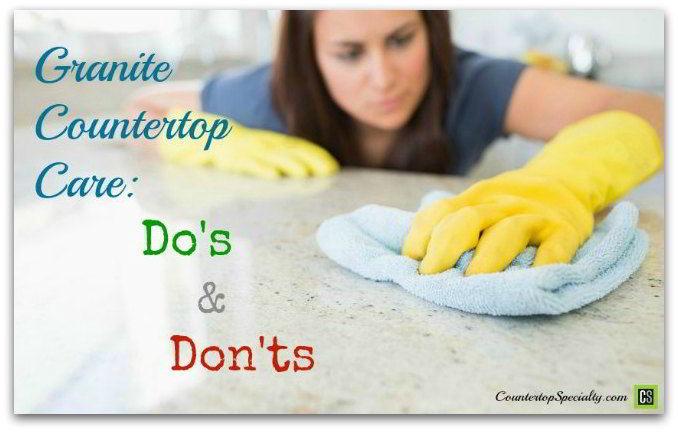
Please enable JavaScript
First Lesson of Granite Countertop CareCorrect knowledge is key. Beware of all the conflicting advice about cleaning granite countertops floating around out there. Some is spot on, and some is dead wrong.
Most errors in advice or solutions are due to over-generalization, a lack of understanding, and/or misinterpretation of correct methods.
So, it's easy to get confused and frustrated. Then the worry starts to set in, and you are afraid that you're going to accidentally ruin your countertops.
Or worse, experiment with some method that you shouldn’t do.
Not to worry. A wealth of information, expert advice, and proven solutions are provided on this site, so you'll avoid potential pitfalls, hassles, and headaches by investing a little time upfront in reading and learning.
Relax though-- it won't take long, and you'll soon be a granite countertop maintenance pro!
Remember that your counters and floors are made of STONE! Think Egyptian Pyramids and Roman Colosseum. Stone countertops and floors are very durable, resilient and age beautifully. In fact, they will outlast you and your house!
Yes, it is possible that the stone can become damaged, but avoiding damage is a cinch, and granite repair is almost always possible when needed. You don’t need to possess any unique talents or have access to an army of professionals to protect, clean, and keep your granite countertops looking brilliant and beautiful for a lifetime.
Now let's have a quick word about that confusing conundrum of.
As a general rule, an impregnating sealer should be applied to all natural stone.
Many people misinterpret "general rule" to mean that absolutely every stone countertop and tile countertop MUST be sealed and often; this is not true.
Many granites and other stones never need sealing, but confusion abounds regarding this key granite care issue. The sealing process is not complicated, but it can turn disastrous with the wrong information.
Common questions include:
For a more thorough discussion go to the Granite Sealer Guide . Our top recommendation is the Permanent Granite & Marble Sealer for use on all natural stone.
Please enable JavaScript
The easiest way to keep your stone looking great is to avoid bad habits that may damage it. Granite, marble, travertine, limestone, soapstone, quartz countertops and other solid surfaces like these are similar in many ways, but their differences require varying degrees of maintenance.
However, if you utilize the granite countertop care and cleaning procedures that apply to all your countertops- no matter what type of stone countertops or surface- you'll eliminate most potential problems without ever having to think too hard about it or worry that you may be causing damage.
Do: Blot up Spills Immediately
Acidic substances like wine, coffee, fruit juices, tomato sauce, and sodas will not etch granite like they do marble, but they could potentially stain the surface. Cooking oils may also leave a stain if not wiped up.
Do: Clean Surfaces Using a Sponge or Soft Cloth
Using a specially formulated natural stone and granite cleaner like this Granite & Marble Cleaning Spray is recommended to keep your countertops in the best condition while also protecting the sealer. However, hot water will do for quick clean-ups.
Dish soap won't permanently damage your granite, but repeated use of soapy water will cause build-up (yes, even if you rinse) and dull your countertop's shine. So, regularly using dish soap for cleaning granite countertops is not recommended.
Do: Use Coasters Under all Glasses, Bottles, and Cans
Again, granite won't etch and using coasters on dense and/or properly sealed granite is not an absolute necessity like with marble, but using coasters is just a good practice to protect all bath and kitchen countertop surfaces.
Do: Use Trivets and Hot Pads Under Pots & Pans
Yes, you can take a hot pot off the stove and put it right on granite countertops without any problems. It is possible for granite (or any stone or quartz) to suffer "thermal shock" and crack, but rare. You don't want to put hot pans on any other surface except for soapstone.
But you must consider other issues as well.
Grit that gets trapped between the pot and the countertop surface may scratch the surface--even granite countertops. Granite is very hard and durable and can take tons of abuse without any significant damage, but it can develop light surface scratches or pitting in high-use areas around the sink and cooktop.
It is not common, but it is possible. And ALL other surfaces are softer than granite. Better safe than sorry.
If it does happen, don't fret too much. Most chips and scratches can be repaired, but it's best to avoid them by following the granite countertop care tips.
Also, once you remove the hot pan from the countertop, the surface will be very hot and may burn.

Do: Use a Cutting Board
Again, avoid the possibility of scratching the solid surface and protect your knives. Cutting on the stone will dull and damage your knives' edges quickly. You should never use your granite counter as a cutting board.
Don't: Use Generic Cleaning Products
Generic cleaning products including bleach, glass cleaners, and other degreasers and common household cleaners that you buy at your local store contain acids, alkalis, and other chemicals that will degrade the granite sealer (and will etch marble) leaving the stone more vulnerable to staining.
Trying to save money by using these chemicals only ensures that you'll spend a lot more time and money on granite countertop care in the long-run.
Don't: Use Vinegar, Ammonia, Lemon or Orange as Cleaners
Most common and name-brand household products are not suitable for cleaning granite countertops (and definitely cannot be used for marble, travertine or most other stones). It is best to avoid using anything that isn’t specifically recommended by the manufacturer. Simply use warm water and a soft cloth. Avoid ammonia-based cleaners and vinegar.
Don't: Use Bathroom, Tub & Tile or Grout Cleaners
The powders and even the "soft" creams contain abrasives that will scratch and dull surfaces.
Don't: Sit or Stand on Your Countertops
Unlike a laminate countertop surface, granite, marble and quartz solid surface countertops are very hard, but not flexible. Additionally, they DO NOT have a plywood backing, so when too much weight is applied in one spot, it could cause a crack.
Don't: Store Liquids or Toiletries Directly on Your Countertop
Cooking oils, hair products, perfumes, colognes, nail products, creams, lotions, and potions tend to spill or leak and often go overlooked.
Even when sealed, a substance that remains on the granite surface for an extended period may stain the granite (and etch marble and other stones). Practice proactive granite countertop care by storing these products on a shelf or decorative tray like they do in fancy hotels!
Hot water and a dish rag or sponge are all you need to clean spills and wipe away crumbs to keep your kitchen countertops clean and tidy throughout the day.
A quick spray and wipe of the main areas of use with a good granite counter cleaner like this Granite & Marble Spray Cleaner are sufficient to clean, disinfect and protect your countertops, and provide a streak-free shine.
Remove (or move aside) all items on the counter and use the granite cleaner over the entire surface, including the edges.
This routine will remove all dust, debris, and hidden gunk or spills that collect around appliances, containers, dish racks, etc.
Using a specific granite cleaner also serves to condition the stone, protect the sealer, and help maintain its overall luster. Of course, this process is much easier if you reduce the clutter on countertops and maintain an organized kitchen.
A temporary granite polish like the Topical Conditioning Stone Polish can be used periodically (weekly to monthly as you like) to enhance the shine for the ultimate in natural stone and granite care.
Such topical dressings are not for maintenance or repair, however, and such products are not what make the countertop shiny.
This type of product "enhances" the shine (like waxing a car), improves cleaning, helps eliminate fingerprints, and provides a slight bit of protection.
Various stone care products call themselves "polishes” but will have completely different purposes.
A topical polish may improve the look a bit but will not correct the problem. And since it's not meant to be permanent, it will wear off with regular use and cleaning.
Testing for sealing granite countertops (the lemon juice and water drop tests) annually is a good idea to determine when you need to reapply a granite sealer. However, that does NOT mean you should be resealing the granite every year.
You'll read and hear that you should be sealing granite every year or every three years, but the proper frequency for applying a granite sealer is not set in stone and really depends on a number of variables. Testing will tell you when it’s time.
You will likely know anyway that resealing is needed when you start to notice that water around the sink darkens the stone; this is a sign that the granite is beginning to absorb the water.
Insider Tip: when shopping for any natural stone, you should perform the lemon juice test prior to purchase on a sample of the exact slab to determine the suitability of the stone for its intended use.
For kitchen countertops especially, you don't want a stone that is too absorbent or a stone that will etch like marble.
Of course, you should also perform the water test upon installation, if you didn't do it while shopping, to determine if your natural stone even needs sealing. Many do not require sealing or cannot be sealed.
The first thing you should understand is that the shine or “polish” on granite countertops or any other stone is not the result of a chemical application, sealing, or cleaning.
The surface “finish” of the granite is created at the factory or quarry where the granite slabs are cut and processed. Huge machines utilize intense grinding and friction processes to smooth the surface so much that it becomes reflective and shiny.
The resulting shiny finish is called a “polished” finish because it has been “polished” to a shine and not because a “granite polish” (product) has been applied.
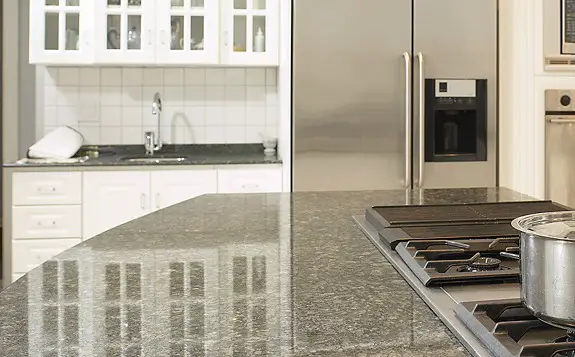
Reflections in shiny polished granite countertop
Thus, the shine is actually part of the granite itself like the glass of a mirror. Using a glass cleaner does not make a mirror reflective. It’s the same with granite. Applying a product does not make it reflective and shiny.
As noted above, a Topical Polish product can enhance that shine so it can look its best (like waxing your car enhances the paint color and shine), but will not put the shine on the granite or repair a dull granite finish.
Dull granite countertops are most often the result of some film (like soap film) on the surface.
Granite is so hard that even years of normal use will not wear away the finish and the finish does not just go dull. It must either be chemically or physically damaged or covered up by a film.
Repeated use of harsh cleaning products, common household cleaners, or regular exposure to acidic foods and drinks (say spills around a coffee maker) can potentially dull the finish; however, this can generally take several years.
If your granite countertops have become a bit dull in spots, then using this DIY Granite Polishing Kit can touch up slightly dull granite and bring back the original shine.
If the surface is really dull, rough, or damaged, then a stone restoration pro may be required to re-polish granite.
But if you can do-it-yourself you'll save a ton of money and you won't make it any worse trying it yourself first.
Granite is porous and susceptible to staining. Stains are always dark spots in the granite. However, this issue is easily controlled or prevented in most cases by applying a granite sealer. And most stains are relatively easy to remove with a granite poultice (either ready-made or DIY. see more below).
The common method for cleaning granite (spray and wipe with a granite cleaner) will not work since stains are inside the stone beneath the surface.
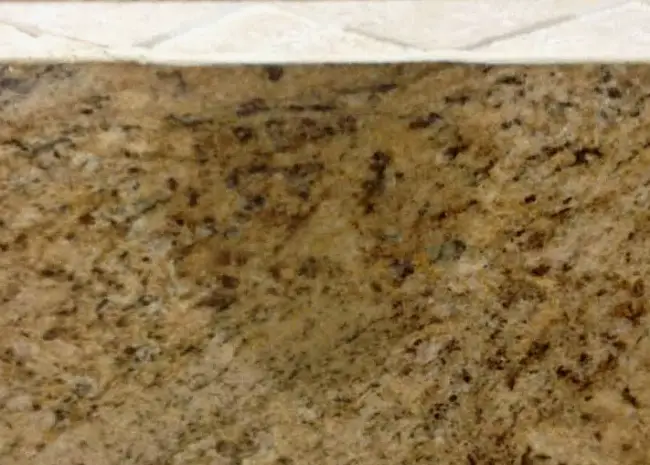
Oil Stain in Granite Countertop
The granite color can give you a general idea of how likely it is that a specific slab of granite will stain.
The trick to removing a granite stain is first knowing what substance caused the stain and then matching that to the correct chemical ingredient for removing that type of stain when making your poultice.
Many poultice recipes exist online. Some are completely bogus, and others are good for only a certain type of stain.
This Marble & Granite Stain Removal ebook details the specific ingredients needed to remove all types of stains along with proper instructions on how to make and apply a poultice (which seems simple but many get it wrong and fail to remove the stain).
So, you can use a ready-made Granite Poultice Powder or make your own with the ebook.
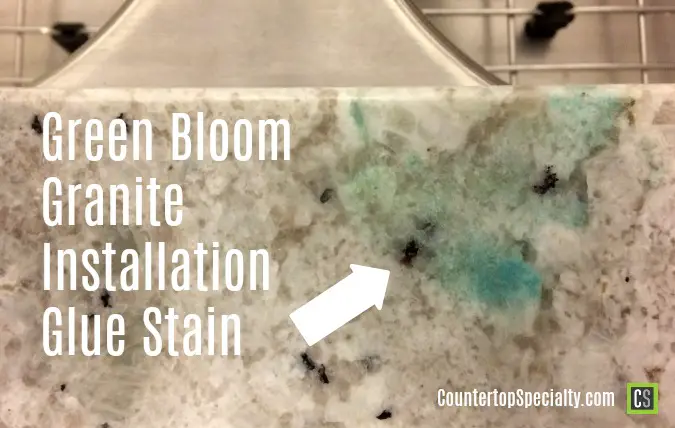
Installation glue stains are unique. These are greenish-blue-gray stains that appear immediately after installation of a new granite countertop and are caused by a reaction of the installation adhesive with the granite.
Pits and chips in granite countertops can occur when small bits of minerals come loose or are knocked out via an impact. Most often this happens around the sink.
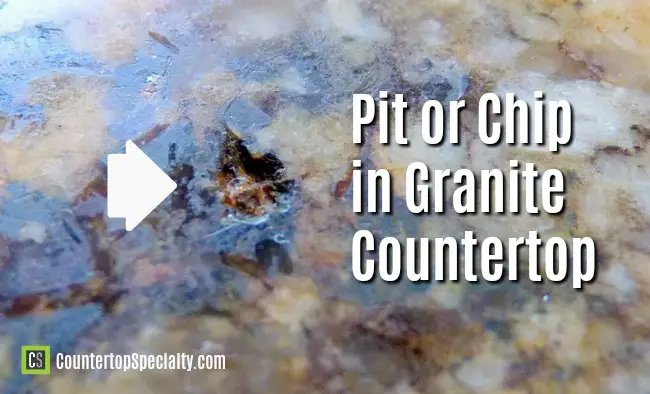
Some granites never get pits and others may chip or pit easily. So, you may never see a pit in your granite countertop, or you may have many over the years.
Granite chip repair is often done by filling the hole with a color-matched epoxy. This works but is often noticeable.
A better method is to fill the pits or chips with clear acrylic for a repair that is nearly invisible. An easy DIY project using this Granite Repair Kit for Chips & Pits.
Finding a crack in your granite countertop is never fun, but it doesn’t always mean disaster.
Granite crack repair is no easy task but depends on the type of crack. Hairline cracks often can be left alone, won’t cause problems, and won’t get worse.
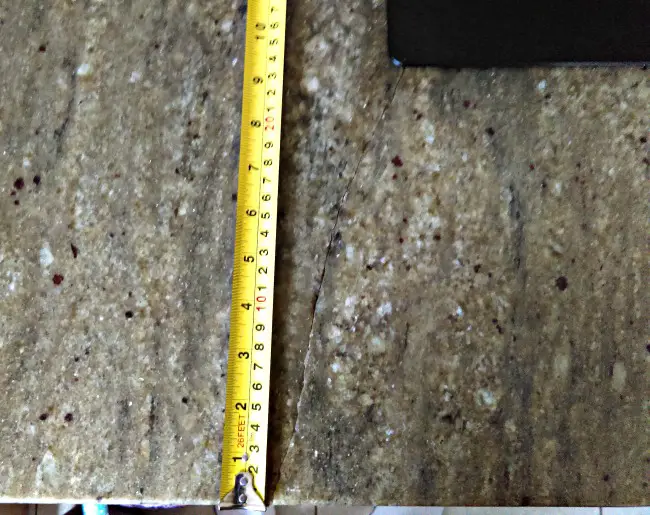
Crack in Granite Countertop
Separated cracks need repair but will still be very visible if the repair is not done well. An experienced stone repair specialist can repair a crack and refinish the granite, so the repaired crack is essentially invisible.
Note that filling granite fissures is different than repairing a crack.
Doctored granite is primarily an issue with black granite countertops. A dye is applied to black granite slabs while at the factory to make them a darker black which commands a higher price. This is a fraudulent practice, but doctored slabs can be difficult to detect and easily make it into the marketplace.
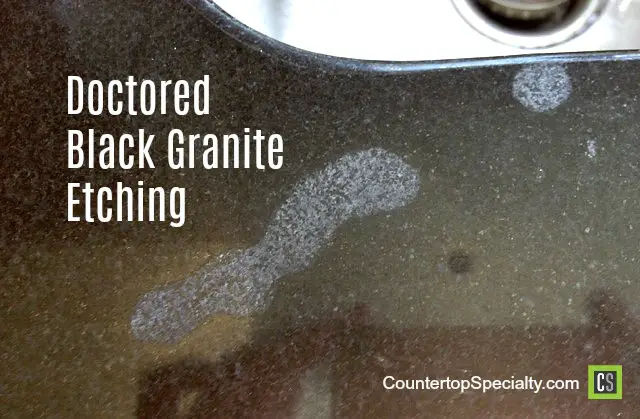
The problem here is that the dye can cause the granite to have an etching or discoloration issue where acidic foods, drinks, or cleaners create dull, chalky spots on the granite. Actually, in the dye.
Granite is not naturally reactive to acids and will not etch except in extreme circumstances with exposure to potent acids or repeated exposure to acids.
A doctored granite countertop is a real pain because there’s no easy fix.
A countertop "cleanability" study testing six countertop materials demonstrated that granite had the greatest reduction of e.coli bacteria count with "normal and reasonable" cleaning methods; better than stainless steel even.
Simple washing and rinsing reduce bacteria counts on granite nine times better than stainless steel.
The Center for Disease Control maintains that there's no evidence that granite collects, holds, or harbors bacteria to any degree that is unsafe or unhygienic.
The Hospitality Industry and the National Institute of Occupational Safety and Health also state that granite is a clean and safe surface.
Quartz countertops are often touted as being cleaner but have tested about the same as granite and are not any cleaner.
Just like regularly washing your hands dramatically minimizes the chance of contracting a virus or developing an infection, wiping away all foods and spills throughout the day and then washing and rinsing the surface (or use a granite cleaner) daily, allows you to keep your kitchen countertops more or less safe and sanitized.
There you have it! The most effective granite countertop care method is simply to avoid damage, which will be easy to do now that you know all the do's and don'ts of cleaning granite.
But also, it's good to know that if any damage does occur, like a stain, chip, or crack, it can usually be removed or repaired.
Finally, if you follow the daily, weekly, monthly, and yearly routine for cleaning granite countertops and use the proper cleaners you'll rarely run into problems. You can maintain your counters in brilliant and beautiful condition with ease.
Now grab a Countertop Specialty coupon code to save on the best granite sealers, cleaners, and repair products.
Learn even more! Click on the links below to read detailed answers to common (and unusual) marble cleaning questions.
New Kitchen Counter Isn't Smooth After Install
QUESTION: We just had new granite kitchen countertops installed, using a high-movement stone with lots of veins and embedded crystals. The sample …
New Black Galaxy Granite. Nitpicky Concerns?
QUESTION: We had Black Galaxy granite countertops with an ogee edge installed this week. And while the overall look is glamorous, I've been disappointed …
Gas Cap Stain On Venetian Gold Granite
QUESTION: I have venetian gold granite countertops. My husband laid a gas tank top from a lawn mower on the counter in two areas. It took the shine …
Professional Granite Floor Cleaning
QUESTION: I have multi-colored granite floor tile. When I bought the house, it was all shiny. Now it has a waxy looking build-up , and I swear there …
Dark Spots on New Granite Countertop
QUESTION: We just moved into our newly built house and we had installed the giallo venetiano granite for our kitchen countertops. The granite countertop …
Stains on Black Galaxy Granite
QUESTION: I had black galaxy granite countertops installed in my wet bar. After one family event, there were glass ring "etched" stains all over …
Candle Wax Stain on Black Galaxy Granite
QUESTION: How do you clean stains from spilled candle wax on my Black Galaxy granite countertop? My husband wiped the candle wax off immediately …
Cleaning Granite Countertops With Hydrogen Peroxide
Is Hydrogen Peroxide safe to use on granite? QUESTION: I recently read that many hospitals use Hydrogen Peroxide (H2O2) to clean surfaces, …